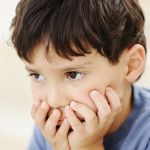Autism Spectrum Disorder
As rates of autism proliferate, an increasing number of families are now living with autism. In Canada figures report that 1 in every 66 children has autism, whereas in the United States figures have been reported as high as 1 in every 59 children. While these numbers are concerning, there is hope – treatment has shown to significantly improve Autistic symptoms.
The information below can act as a starting point in understanding autism, the approach to treatment by a Naturopathic Doctor, as well as resources that can help you and your family through this life changing diagnosis.
Understanding Autism

Autism Spectrum Disorder (ASD) refers to a range of disorders that share similar characteristics, such as social impairment, difficulties with communication and repetitive, restricted and stereotyped patterns of behaviour. While a number of shared characteristics exist there are individual differences in the number and type of symptoms, the severity, age of onset, levels of functioning, and challenges with social interactions. Disorders on the spectrum include Asperger Syndrome, Childhood Disintegrative Disorder, Rett Syndrome, Pervasive Developmental Disorder (PDD) and PDD Not otherwise specified.
Cases of ASD are found across all cultures and socio-economic groups, however boys are 4 times more likely to have a diagnosis than girls.
A complex series of interactions in several body systems, primarily the central nervous system (brain), the gastrointestinal system (the gut), and immunological system (body defense) results in autistic behaviours.
What are the signs?
Signs of autism exhibit themselves through the following developmental characteristics:
-
- No/fleeting eye contact
- Loss or absence of speech
- Self stimulation
- Hyperactivity
- Issues with motor planning
- Difficulties with transitions
- Developmental regression
- Insistence on sameness
- Unusual sensory interests
- Narrow restricted interests
- Involuntary repetition of other’s spoken words
- Repetitive behavior
- Dyspraxia – loss of the ability to coordinate movements
Stimming
Newly Diagnosed?
An autism diagnosis challenges you and your family emotionally, mentally, physically and spiritually. For some it can feel overwhelming and unwieldy while for others there is relief at finally understanding what is going on with their child. There is no wrong reaction.
Numerous resources exist to help you through this time and beyond. The quality of your child’s life can be enhanced through the appropriate use of treatments and interventions. Choosing a treatment for your child is an important task and one that should not be taken lightly. Inform yourself by gathering information from a variety of sources – professionals, the internet, reports from conferences, other parents, professional journals, autism organizations etc.
Please see the Resources section below for some research starting points as well as family support groups in the Edmonton area.
Naturopathic Treatment
Functional or Biomedical Medicine?
Naturopathic treatment approaches autism from a biomedical perspective, which views autism as a neurodevelopmental disorder resulting in abnormal behaviors, delayed speech, autoimmunity and a wide variety of other health problems (chronic infections, allergies). Contributing factors are not (strictly) psychological and while there is a genetic basis, environmental influences do play a big role as do nutrient deficiencies such as absorption problems, suboptimal diets leaky gut syndrome.
Why use Functional or Biomedical Medicine?
An autism diagnosis is often paired with a significant number of other medical concerns that can be difficult to treat (see areas of dysfunction and environmental/lifestyle factors below). In addition there is evidence linking the medical concerns with cognitive performance.
A number of benefits come from using a biomedical approach to treatment including: increases in language complexity, social awareness/interaction, cognition/learning, eye contact/responsiveness, normalized behaviours and understanding/feeling emotions.
Areas of Dysfunction
- Detoxification impairment
- Endocrine imbalance
- Gastrointestinal distress
- Heavy metal toxicity
- Immune dysfunction
- Infection – Lyme disease, PANDAs, etc
- Inflammation
- Neurotransmitter imbalance
- Nutritional deficiencies
- Oxidative burden
Contributing Factors
- Peptide metabolism: Gluten, Casein & Soy Intolerance
- Impaired detoxification (methylation & transulfuration ‘defects’
- Xenobiotic exposure
- Correct nutrient deficiencies
- Dysbiosis: Yeast, Bacterial (clostridia, streptococcus)
- Chronic antibiotic use, immune deficits
- Heavy metal toxicity: Hg, Pb, Al, As, etc
- Medications
- Chronic infections: Viral (measles), Lyme disease
- Genetic anomalies
- Additional considerations
What to Expect at Natural Terrain
The approach to treatment is holistic – and therefore a number of areas are examined to provide a well-rounded treatment plan.
History: Understanding the genetic and medical history of a child is essential to understanding the larger picture. Things like parent’s health, birth history, vaccine history, illness/antibiotic use, bowel history, etc. assist with this.
Physical Exam: A complaint oriented physical exam is performed.
Lab Work: A Basic Autism Panel or Comprehensive Panel is recommended. See http://www.greatplainslaboratory.com/home/eng/autism.asp
Diet: A change in diet (gluten free/casein free) can improve digestion, allergies, speech production and behaviour.
Supplements: Basic supplements are suggested to/for: improve bowel function, reduce methylation (Vitamin B12 subcutaneous injection), basic detoxification, complaint oriented supplements and vaccine detoxification.
Detoxification / ‘Die Off’ Reaction
With treatment signs of discharge will occur, this indicates that detoxification is happening. Signs of discharge include changes in stool color, odor, irritability, flu-like symptoms, increase in current behaviours, increased stimming, hyperactivity, headaches (presented by head banging), etc.
Resources
Books
- Biological Treatments for Autism and PDD by William Shaw, PhD
- Effective Biomedical Treatments by Jon Pangborn, PhD and Sidney Baker, MD
- Breaking the Vicious Cycle by Elaine Gotschall
- Evidence of Harm by David Kirby
Videos
The Greater Good (2011)
Websites
http://www.greatplainslaboratory.com
http://www.sanesco.net
http://www.rmalab.com
http://www.autism.com
http://www.tacanow.com
Family Support Groups
Autism Society of Edmonton Area – 780.453.3971
Centre for Autism Services Alberta – 780.488.6600
Autism Toolkits
Autism Speaks Canada – Family Services Tool Kits
References
Fact Sheet – National Institute of Neurological Disorders and Stroke
Biomedical Treatment – Treat Autism & ADHD
Life Journey Through Autism: A Parent’s Guide to Research – OAR
Medical and Biomedical Approaches – ASC
What are Autism Spectrum Disorders – ASC
What is Autism? – Kerry’s Place